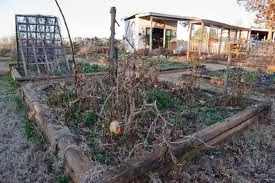 |
| Image from Google |
But really, sometimes it just doesn't turn out how I envision it.
 |
| Image from Google |
So, with my beautiful garden in mind I've decided to start my garden early and I've decided to go the thrifty way. I like the idea of saving money and being resourceful. Being a newlywed, newly graduated, no job woman, I like saving money. There are lots of things that you can do to save money when you plant a garden. One of those things is to start your vegetables from seed. Buying young vegetables that have already started growing can be two to three times more expensive than buying seeds. Seeds can be very easy to grow, but do take time. That's why I'm starting before the last frost (usually around Mother's Day) so that I can get a head start and save some money.
How to start your vegetables from seed
1. Pick out your seeds!
The sky is the limit! This is the very best part. Think about your Summer and your favorite Summer foods. Mine has to be salsa (Roma tomatoes, white onions, cilantro, jalapenos), tomatoes-cheese-onion sandwiches (tomatoes and white onions), corn on the cob (sweet corn), and squash and pumpkins for Halloween! Plant the vegetables that you eat the most. This will help you save money too. If I can pay 1.50 for all the fresh cucumbers that I can consume this Summer, that's going to save me money.
 |
| My beauties!! |
2. Prepare to plant your seeds
Ok, there are a lot of different options here. First, you need something to put your seeds in. My budget allowed for me to buy a seed starter kit (it was about $5.50 at Cook's). You can even use a left over egg carton (look, you're already saving money!). Then you need some soil to put in your tray or egg carton. Seeds don't need fertilizers, just regular soil. I would suggest getting a cheap, small bag from the store. This one I got was a little less than $7. It is a special mix for starting seeds (I'm hoping this will help me as I'm growing my green thumb).
 |
| This is the starter kit |
 |
| This is an egg carton tray Image form Google |
3. Plant those seeds
Every seed is going to have different needs. They may not even be ready to plant right away (for example I am waiting till later in the season to plant my spaghetti squash). Every seed packet has directions on them so that you will know how to grow them. The packets will definitely tell you how deep to plant the seed. So, take your seed, follow the instructions on depth and plant your seeds. You can plant multiple seeds in each space if you want, but one will do. I think I might put a few of each kind in each space, just in case some don't grow and I can thin (after the plants reach 1" in height you can cut all the extra stems down, so there is only one stem a space) later if I need to.
4. Water
Moisture is the essence of wetness, and wetness is the essence of beauty. My boy Derek Zoolander said it best, if you want beautiful veggies you have to water them. These little guys don't need a ton of water, but they need some. I would suggest a spray bottle, or something with a small spout and water everyday, more like mist everyday. Don't drown your plants though.
5. Sunlight
Place your tray or egg carton on a window sill so that it can get a lot of sun light (if your window is facing north this isn't going to work very well). As your seeds start growing into plants and the weather starts getting warmer you can take your tray outside for a couple hours every day to help wean them into normal plant life.
 |
| Here they are in my windowsill, ready to grow! |
6. Transplant to your garden
After your seeds are grown and ready to be planted (remember those packets will tell you what time of year to plant) then it's time to transplant to your garden! A beautiful day. Your packet will tell you how far apart to plant them as well. Once plants are at this stage you can start using fertilizer to help them grow.
I'm super stoked to watch these puppies grow! I'll keep you updated on my progress.

No comments:
Post a Comment